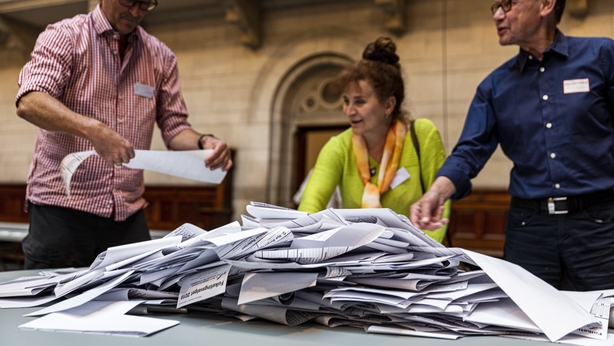Demark’s opposition Social Democrats looks set to win the general election with more than 90% of votes counted, after a collapse for the far-right and a surge for the main green party.
The Social Democrats led by Mette Frederiksen are the biggest party with around 26% of votes, with projections based on 94% of votes counted.
Exit polls by public broadcasters DR and TV2 credited her left-wing bloc with a slight majority of 90 of 179 seats.
The results signal a collapse for the anti-immigrant Danish People's Party, which has informally supported Prime Minister Lars Lokke Rasmussen's Liberal Party, in power for 14 of the last 18 years.
Mr Rasmussen has conceded defeat.
"We had a really good election, but there will be a change of government," he told supporters at an election night rally.
The Danish People's Party, which has supported successive minority right-wing governments in exchange for tighter immigration policies for the last two decades, saw its support halved to around 10%, the party's worst result since 1998.
Leader Kristian Thulesen Dahl told supporters that the party had not been "good enough" and he shouldered the blame, but also said he wanted to continue at the helm.
Social Democrats U-turn on immigration
The Social Democrats, last in power between 2011 and 2015, were widely seen as favourites going into the vote.
The party has also changed its tone on immigration.
As Ms Frederiksen cast her vote in the Copenhagen suburb of Varlose, she told reporters her party's tougher immigration proposals were winning back supporters.
"Some Social Democrat voters who have been lost in the last few years, who didn't support our migration policy, are returning this time," she said.
Ms Frederiksen herself denounced Denmark's policy as one of the "toughest in Europe", in the early 2000s.
But under her leadership, the Social Democrats last year proposed, as part of their crackdown on immigration, to send asylum seekers to special camps in North Africa while their requests are processed.
The party has said that if victorious, it plans to form a minority government - common in Denmark's proportional representation system - relying on the support of other parties to pass legislation.

As Denmark enjoys robust growth, almost full employment and strong public finances, the Social Democrats focused on climate issues and the defence of the welfare state, promising to reverse budget cuts to education and healthcare.
Voter turnout, which is typically high, is expected to come in at more than 85%.
The main green party - the Socialist People's Party - was one of the election's big winners, with 7.5% of votes, up from 4.2% in 2015.
The Danish People's Party's slide has meanwhile coincided with the emergence of two more extreme far-right parties, New Right and the anti-Muslim Hard Line, which are both hovering around the 2% minimum for representation in parliament.
The Danish parliament - the Folketing - has 179 seats, four of which represent the autonomous territories of Greenland and the Faroe Islands, which have two seats each. To be eligible for a seat, a party must win at least 2% of votes.

